
Board games are tabletop games that typically use pieces. These pieces are moved or placed on a pre-marked game board and often include elements of table, card, role-playing, and miniatures games as well.

Monopoly is a multiplayer economics-themed board game. In the game, players roll two dice to move around the game board, buying and trading properties and developing them with houses and hotels. Players collect rent from their opponents and aim to drive them into bankruptcy. Money can also be gained or lost through Chance and Community Chest cards and tax squares. Players receive a salary every time they pass "Go" and can end up in jail, from which they cannot move until they have met one of three conditions. House rules, hundreds of different editions, many spin-offs, and related media exist.
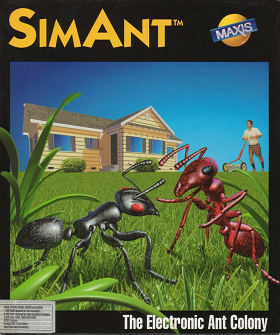
SimAnt: The Electronic Ant Colony is a 1991 life simulation video game by Maxis and the company's third product, focusing on ants. It was designed by Will Wright. In 1992, it was named "Best Simulation Game" at the Software Publishers Association's Codie awards. SimAnt was re-released in 1993 as part of the SimClassics Volume 1 compilation alongside SimCity Classic and SimLife for PC, Mac and Amiga. In 1996, SimAnt, alongside several of Maxis' simulation games were re-released under the Maxis Collector Series with greater compatibility with Windows 95 and differing box art, including the addition of Classics beneath the title.
In tabletop games and video games, game mechanics are the rules or ludemes that govern and guide the player's actions, as well as the game's response to them. A rule is an instruction on how to play, a ludeme is an element of play like the L-shaped move of the knight in chess. A game's mechanics thus effectively specify how the game will work for the people who play it.
A government simulation or political simulation is a game that attempts to simulate the government and politics of all or part of a nation. These games may include geopolitical situations, the creation of domestic political policies, or the simulation of political campaigns. They differ from the genre of classical wargames due to their discouragement or abstraction of military or action elements.
Robert Sommer was an internationally known Environmental Psychologist and held the position of Distinguished Professor of Psychology Emeritus at the University of California, Davis. Sommer wrote 14 books and over 600 articles, he was best known for his book Personal Space: The Behavioral Basis of Design (1969), which discusses the influence of the environment on human activities.

Monopoly Tycoon is a construction and management simulation PC game published in 2001 by Infogrames Interactive and developed by Deep Red Games. The player operates a business that owns stores and apartments in a city derived from the Monopoly board game. Instead of using dice, the game relies more on the speed and innovativeness of the players. In the standard mode, the user plays against the AI opponents. In the multiplayer version, players go against other online players in order to gain victory.

Cooperative board games are board games in which players work together to achieve a common goal rather than competing against each other. Either the players win the game by reaching a predetermined objective, or all players lose the game, often by not reaching the objective before a certain event ends the game.

Life simulation games form a subgenre of simulation video games in which the player lives or controls one or more virtual characters. Such a game can revolve around "individuals and relationships, or it could be a simulation of an ecosystem". Other terms include artificial life game and simulated life game (SLG).

The board game Monopoly has its origin in the early 20th century. The earliest known version, known as The Landlord's Game, was designed by Elizabeth Magie and first patented in 1904, but existed as early as 1902. Magie, a follower of Henry George, originally intended The Landlord's Game to illustrate the economic consequences of Ricardo's Law of economic rent and the Georgist concepts of economic privilege and land value taxation. A series of board games was developed from 1906 through the 1930s that involved the buying and selling of land and the development of that land. By 1933, a board game already existed much like the modern version of Monopoly that has been sold by Parker Brothers and related companies through the rest of the 20th century, and into the 21st. Several people, mostly in the midwestern United States and near the East Coast of the United States, contributed to its design and evolution.

Easy Money or The Game of Easy Money was a board game introduced by Milton Bradley Company in 1935. Like Monopoly, the game is based on The Landlord's Game in the movement of pieces around the board, the use of cards, properties that can be purchased, and houses that can be established on them.

Finance, or The Fascinating Game of Finance or Finance and Fortune, is a board game originally released in 1932. The game is based on The Landlord's Game in the movement of pieces around the board, the use of cards, properties that can be purchased, and houses that can be erected on them. The game also has railroads; however, these may not be purchased. The game is a predecessor to Monopoly.
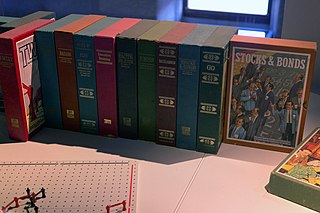
The 3M bookshelf game series is a set of strategy and economic games published in the 1960s and early 1970s by 3M Corporation. The games were packaged in leatherette-look large hardback book size boxes in contrast to the prevalent wide, flat game boxes. The series grew to encompass over three dozen games. Most were multi-player board games or card games; a few were trivia games or two-handed board games. Acquire and TwixT were among the best-selling titles. The series later became part of the Avalon Hill Bookcase games. Very few of these games are still being published.

A game is a structured type of play, usually undertaken for entertainment or fun, and sometimes used as an educational tool. Many games are also considered to be work or art.
Triopoly is a board game by Reveal Entertainment. It plays in much the same way as Monopoly, except that it has three tracks of properties instead of one, and additional buildings which may be constructed on squares. The tracks of the board are arranged concentrically, the middle two being slightly raised to form a ziggurat.
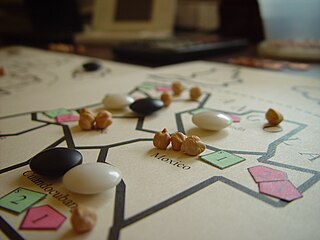
Game design is the process of creating and shaping the mechanics, systems and rules of a game. Games can be created for entertainment, education, exercise or experimental purposes. Additionally, elements and principles of game design can be applied to other interactions, in the form of gamification. Game designer and developer Robert Zubek defines game design by breaking it down into its elements, which he says are the following:
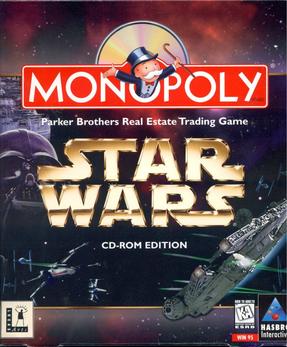
Monopoly Star Wars is the 1997 Monopoly Star Wars video game based on the board game and set in the Star Wars fictional universe. It is one of many Monopoly video game adaptions. The game was developed by Artech Studios and published by Hasbro Interactive. It was released exclusively for Microsoft Windows computers. The game employs the same basic ruleset of traditional Monopoly gameplay, but the Star Wars theme includes famous characters and locales in place of the original game pieces and properties.
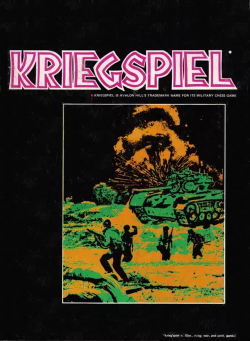
Kriegspiel is a board wargame published by Avalon Hill in 1970 that simulates a hypothetical war between two nations. Although the simple game sold well to new players, it received negative reviews by more experienced gamers.

Luftwaffe, subtitled "The Game of Aerial Combat Over Germany 1943-45", is a board wargame originally published by Poultron Press in 1969 under a different title, then subsequently sold to Avalon Hill, who republished it in 1971. The game is an operational simulation of the American bombing campaign against Germany during World War II.















